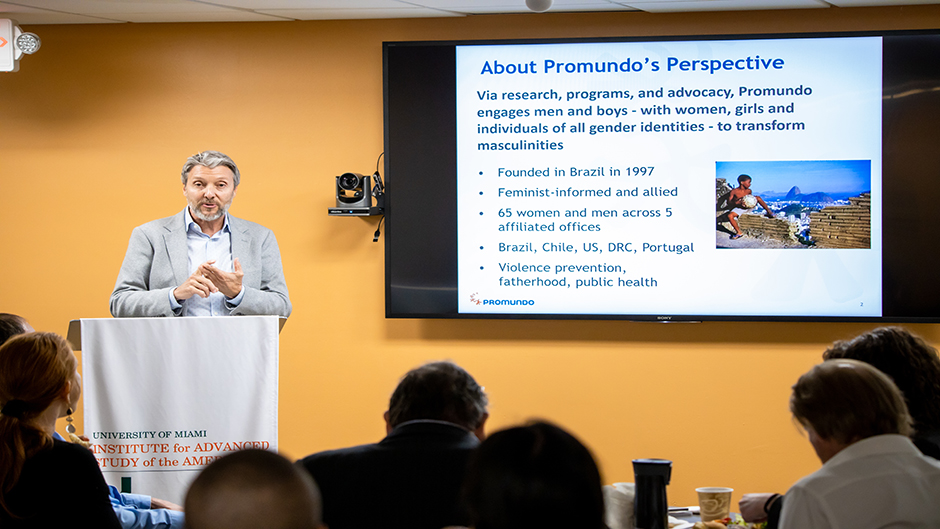The persistence of harmful masculine stereotypes – the Man Box – exacts a high cost on Latin American men, their families, and society, a leading global voice on positive masculinity told an audience at the University of Miami’s Institute for Advanced Study of the Americas.
“Younger men in Latin America are living and accepting gender equality – well, maybe,” said Gary Barker, president and CEO of Promundo, in launching his presentation “Cultures of Masculinities in Latin America: Promundo's Research and Programmatic Work to Promote Healthy, Caring Manhood.”
Founded in Brazil in 1997, Promundo has expanded its work around the globe and today nurtures partnerships in more than 40 countries to advance gender equality and prevent violence through its research, programs, and advocacy.
Felicia Marie Knaul, director of the Institute for Advanced Study of the Americas and Leonard M. Miller School of Medicine professor, and Merike Blofield, director of the University’s Gender and Sexuality Studies Program, which co-sponsored the talk, welcomed Barker.
Both praised Promundo’s research and advocacy as critical to the field of Gender Studies and closely aligned with the University’s trajectory as a hemispheric university.
“Ninety percent of my research in this area comes from Promundo – it’s the absolute foundation for bringing men back into the picture,” said Blofield, adding that the gender studies field is “desperately in need of more of this empirical research.”
Barker’s presentation shared household survey data from Brazil, Mexico, Chile, Nicaragua, and El Salvador in an intent to explore this “complex dynamic nature of these things we call masculinity.”
In examining the seven pillars of masculine behavior and attitudes – self-sufficiency; acting tough; physical attractiveness; rigid masculine gender roles; heterosexuality and homophobia; hypersexuality; and aggression and control, Promundo concludes that while there has been some progress in loosening the shackles of harmful stereotypes, vast numbers of men suffer the outcomes of suicide, depression, sexual violence, bullying and violence, binge drinking, and traffic accidents.
The consequences in Latin America continue to be especially deadly.
One-third of homicides globally occur in the region, and the homicide rate in Latin America is four times that of the global average. Men are far and away the principal victims and perpetrators of this violence.
“The face of this violence is a low-income young man,” Barker explained, citing data from a slide “Cumulative Effect of a War on Young Black Men Brazil” documenting that nearly five million young men have died prematurely due to homicides and traffic accidents in the country over the past few decades.
“This is a topic we’ve been making noise about,” Barker said, adding that the organization’s efforts to educate on stereotypes and gender equity earned a derogatory comment from the conservative Brazilian president.
Promundo’s research shows that positive masculinity is intrinsically linked to fatherhood and caregiving, and this past June produced a State of the World Fathers Report: Unlocking the Power of Men’s Care.
Barker shared studies showing that fatherhood brings significant satisfaction to many men – and that the connection with Dad is beneficial to children, but that in Latin America and elsewhere norms persist that preclude more men from experiencing more of this satisfaction.
“Between 62-82 percent of Latin American men say that my most important role is to be a provider. This in itself is not a problem – the problem is that too many men see this as their only role,” Barker said, adding “we’re exploring what we can do to nudge men to do what most men say they want to do.”
Promundo’s research has also demonstrated the financial cost to societies of the Man Box syndrome.
“Manhood doesn’t sit in men’s heads,” Barker said, “it lives in the heads of those around them.
“Clearly there’s something that continues to push men into the box, but these norms are not our biological condition,” he said, adding that Promundo’s efforts are intent on “introducing men to a new planet.”
In Latin America, Promundo’s partner organizations through the Men Care: A Global Fatherhood Campaign include Fundación CulturaSalud (Chile), Cómplices por la Equidad (Mexico); Puntos de Encuentro (Nicaragua); and Instituto Papai (Brazil).

